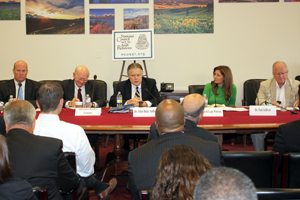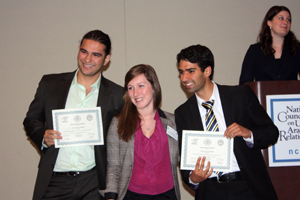Arabia, the Gulf, & the GCC Blog
The “Arabia, the Gulf, and the GCC” blog features insights and analysis from the National Council on U.S.-Arab Relations as well as information about the Council’s programs, projects, events, and activities. Founded in 1983, the National Council is a non-profit, non-governmental, educational organization dedicated to improving American awareness, knowledge, and understanding of the Arab region.
Gulf in the News – May 31, 2013
Gulf countries may place Hezbollah on terror list Source: Kuwait Times (Read full story) Gulf Arab states will

Upcoming Event: “Crisis Syria: Going Where?” – June 7 in Washington, DC
On June 7, 2013, the National Council on U.S.-Arab Relations and the U.S.-GCC Corporate Cooperation Committee are hosting
Gulf in the News – May 29, 2013
GCC Foreign Ministers to meet in Jeddah Source: Khaleej Times (Read full story) … Al-Zayani added that the

Listen to Recent NCUSAR Events
Audio recordings (“podcasts”) of National Council on U.S.-Arab Relations’ events are available through iTunes, FeedBurner, and the Council’s
Gulf in the News – May 24, 2013
Saudi charities face funding crisis over terror fears Source: Arab News (Read full story) Credible Saudi charities are

Bahrain: A Conversation About Its Challenges and Opportunities
On May 21, 2013, the National Council on U.S.-Arab Relations and the U.S.-GCC Corporate Cooperation Committee hosted “Bahrain:
Gulf in the News – May 22, 2013
UAE slams Iran for Bahrain interference Source: Khaleej Times (Read full story) The UAE on Sunday condemned Iran
Join NCUSAR’s Online Community
Connect online with the National Council on U.S.-Arab Relations! Facebook Twitter LinkedIn Arabia, the Gulf, and the
Gulf in the News – May 20, 2013
GCC is 13th largest world economy Source: Emirates 24/7 (Read full story) Gulf hydrocarbon producers emerged as the
Gulf in the News – May 17, 2013
Major Saudi firms in Forbes Top 500 list Source: Arab News (Read full story) With the support of

Model Arab League Update – April 2013
The National Council on U.S.-Arab Relations’ Model Arab League program saw the successful completion of six Models during
Gulf in the News – May 15, 2013
Cabinet ministers resign amid standoff with MPs Source: Kuwait Times (Read full story) … The new developments came
